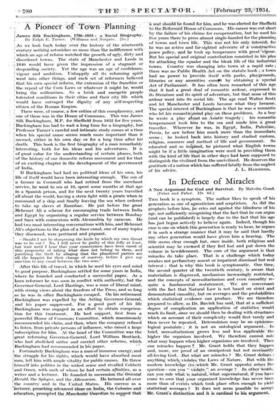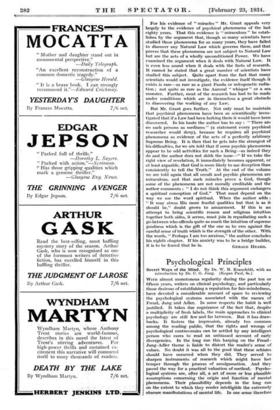In Defence of Miracles
A New Argurnent for God and Survival. By Malcolm Grant, (Faber and Faber. 12s 6d.) Tins book is a- symptom. The author likes to speak of his
generation as one of agnosticism and scepticism. As did the Prophets before him, 4ze cries out against the blindness of his age, not sufficiently recognizing that the fact that he can argue (and can be published) is largely due to the fact that his age has just begun actively to believe' again. Indeed, though his
case is one on which -thiS generation is ready to hear, he argues
it in such a strange Manner that it may be said that hardly any other generation would have given him a hearing. The title seems clear enough but, once inside, both religious and scientist may be excused if they feel lost and put down the volume in bewilderment. The core of the argument is that
miracles do take plac4; That is a challenge which today
awakes not perfunctory assent or impatient dismissal but real
interest : that is why this book is symptomatic. Our time, the second quarter of the twentieth century, is aware that materialism is disproved, mechanism increasingly restricted, and the concepts of necessitarianism and even causality re- quire a fundamental restatement. We are conversant with the fact that Natural Law is not based on strict and demonstrated causality, but on averages and the probabilities which statistical evidenee can produce. We arc therefore prepared to allow, as Dr. Bavink has said, that at a sufficient degree of complication an application of statistics would reach its limit, since we should then be dealing with structures which on account of their complexity would first rarely and then never be repeated.. Determinism may be an epistemo- logical postulate ; it is not an ontological argument - In brief, necessitarianism grows less and less applicable the higher the organism involved. We therefore cannot rule what may happen when.higher organisMs are involved. Then can miracles happen le__ Mr. Grant holds that they happen and, more, are proof of an omnipotent but not necessarily all-loving God.. ',But Whit are miracles ? Mr. Grant deffifes : anything whiellrviolates the Laws of Nature. But with the modem knowledge (tO■Which Mr. Grant appeals) arises the question—can you " viblate.". an average ? In other Words, can you rule what is nattiral,.:What suriernatural, if you have come to own that your organized knowledge has never been more than of events which took place often enough to yield For his evidence of " miracles " Mr. Grant appeals very largely to the evidence of psychical phenomena of the last eighty years. That this evidence is "miraculous " he estab- lishes by the argument that, though so many scientists have studied these phenomena for so many years, they have failed to discover any Natural Law which governs them, and that proves that these phenomena are not subject to Natural Law but are the acts of a wholly unconditioned Power. We have examined the argument when it deals with Natural Law. It is even less sound when it deals with the facts of research. It cannot be stated that a great number of scientists have studied this subject. Quite apart from the fact that many scientists would not investigate, the evidence itself though it exists is rare—as rare as a giant Panda or mitogenetic radia- tion ; not quite so rare as the Auroral " whisper " or a sea monster. Further, most of the research has had to be made under conditions which are in themselves a great obstacle to discovering the working of any Law.
But Mr. Grant goes further. Not only must he maintain that psychical phenomena have been so scientifically inves- tigated that if a Law had been lurking there it would have been discovered. In his haste the author has to say : " There are no such persons as mediums " (a statement every psychical researcher would deny), because he requires all psychical phenomena as evidence of the acts of a perfectly arbitrary Supreme Being. It is then that he gets into the strangest of his difficulties, for we are told that if some psychic phenomena appear to be odd activities for such a Being—as indeed they do and the author does not shirk the issue—" If we take the right view of revelation, it immediately becomes apparent, or at least arguable, that God is more likely to use deception than consistently to tell the Truth." At the end of the volume we are told again that all occult and psychic phenomena are miraculous, and that such miracles prove a God, though some of the phenomena are not morally creditable and the author comments : " I do not think this argument endangers a spiritual conception of God." That must depend on the way we use the word spiritual. When the author adds " It may stress His more fearful qualities but that is as it should be," doubt grows to amazement. If this is an attempt to bring scientific reason and religious intuition together both sides, it seems, must join in repudiating such a go-between who offends quite as much the intuition of supreme goodness which is the gift of the one as he errs against the careful sense of truth which is the strength of the other. With the words, " Perhaps I am too anxious," the author concludes his eighth chapter. If his anxiety was to be a bridge builder,

















































 Previous page
Previous page